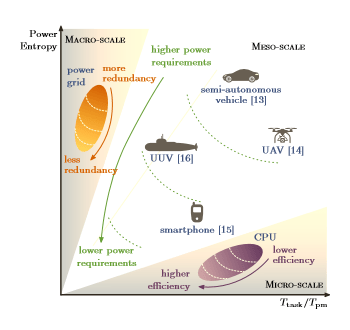Research Theme
XZ Group at Washington University in St. Louis pursues research on the design and optimization of micro-scale autonomous systems with enhanced efficiency, resilience, and security. We take a cross-layer co-design approach that vertically integrates innovations from algorithm, computer architecture, circuits, and sensing/actuation mechanism layers of a full system stack.
One major focus of our research is to achieve end-to-end energy efficiency in autonomous cyber-physical systems with several research thrusts:
Data computation efficiency

The unprecedented rapid growth of data and the end of Dennard scaling have brought computation energy efficiency into focus in both academia and industry. Techniques such as dynamic frequency and voltage scaling and near-threshold computing have been actively explored in low-power mobile devices, as well as in high-performance Exascale computing. Computation in miniaturized autonomous systems faces even more stringent power budget and higher real-time performance demand, and this trend will continue as we deploy more advanced artificial intelligence in those systems. Our research looks into leveraging hardware acceleration and heterogeneous architecture to improve the energy efficiency of robotic computation including perception, cognition, and control, and we plan to explore novel analog and mixed-signal domain computing to close the efficiency gap.
Information conversion efficiency

However, computation energy is only part of the puzzle. In a cyber-physical system such as an autonomous robot, signals have to cross the boundary between the physical world to the information/cyber world before they can be processed computationally. Extracting and converting the analog signals to useful information represented by digital bits can cost significant energy, sometimes even surpassing computation energy. We envision a new paradigm where useful information is optimally extracted from the analog domain across channels and modalities by leveraging the optimization framework of deep learning.
Power delivery efficiency

Much efforts have been devoted to improving efficiency at the power consuming load side, yet energy is invariably lost along the power delivery path. For a holistic treatment of energy efficiency optimization, we are interested in the cross-layer dynamic interactions between the computational workload and the power delivery subsystem. While current power delivery subsystem is often fixed hardware, we believe a software-defined configuration is possible and could offer superior efficiency performance.
Another research direction we are forging ahead is to study how energy efficiency and system resiliency are intertwined in today’s complex cyber-physical platforms and to develop a principled approach to managing it, especially in meso-scale platforms, which fall in between the macro-scale power grid and the micro-scale on-chip power management of integrated circuits:
Meso-scale power orchestration

Power distribution among components in existing cyber-physical systems is rigid and fixed at design time, which is proving increasingly brittle in the face of the growing complexity and dynamism of these systems. These limitations are particularly evident in meso-scale systems due to semantic mismatches between ensuring precise power management and the complexity of high-level task, as well as model uncertainty inherent in the diverse sources of variability from the system. Our research will pioneer a layered modular power flow orchestration framework to enable agile yet resilient power distribution and allocation without comprising efficiency.
Finally, in addition to the relationship between efficiency and resilience, we are investigating the intricate trade-off between efficiency and security with a focus on side-channel attack vulnerability.
SPONSORS




COLLABORATORS
Prof. Vijay Janapa Reddi, The University of Texas at Austin
Prof. Jingwen Leng, Shanghai Jiao Tong University
Prof. Christopher D. Gill, Washington University in St. Louis